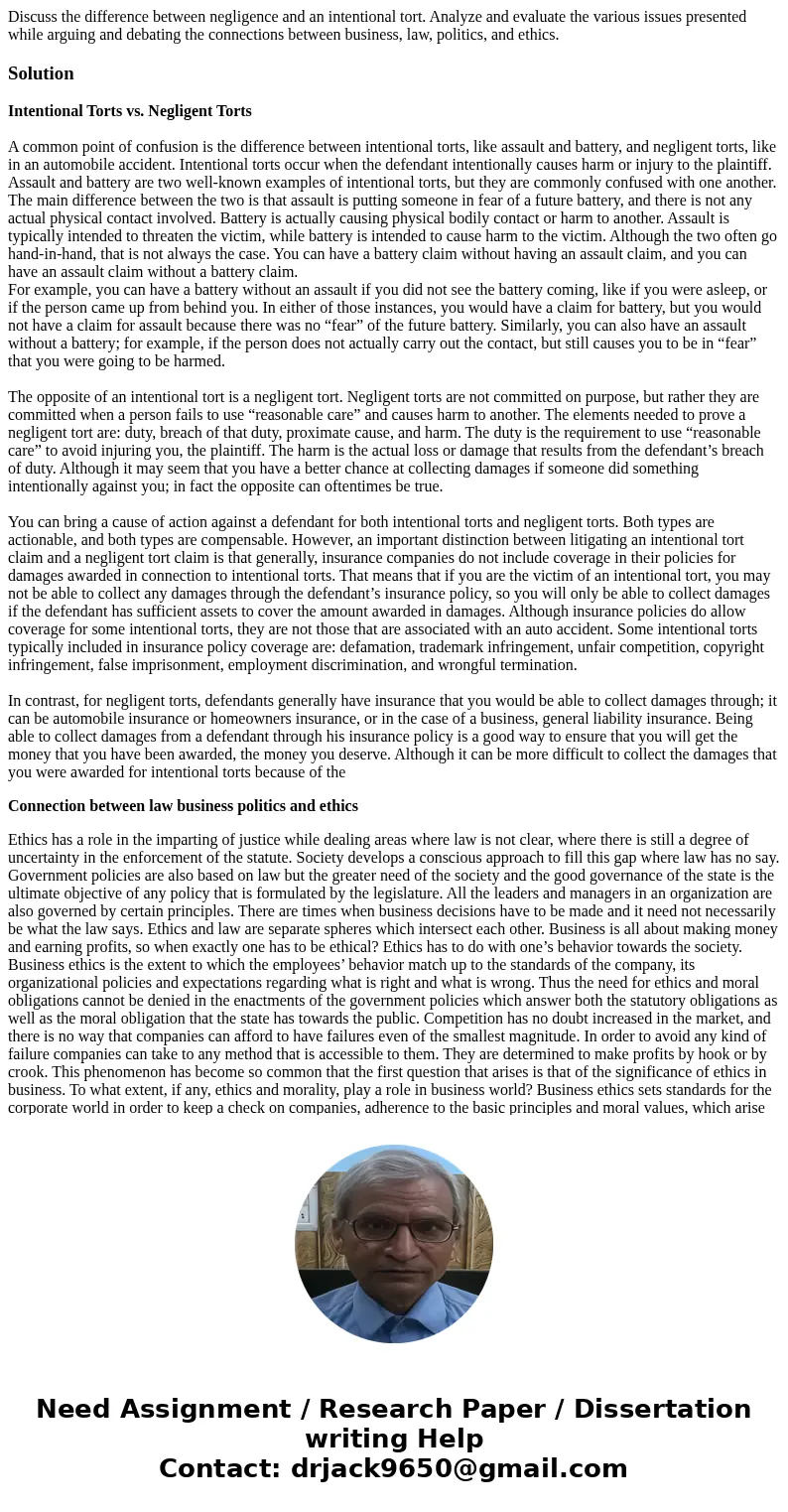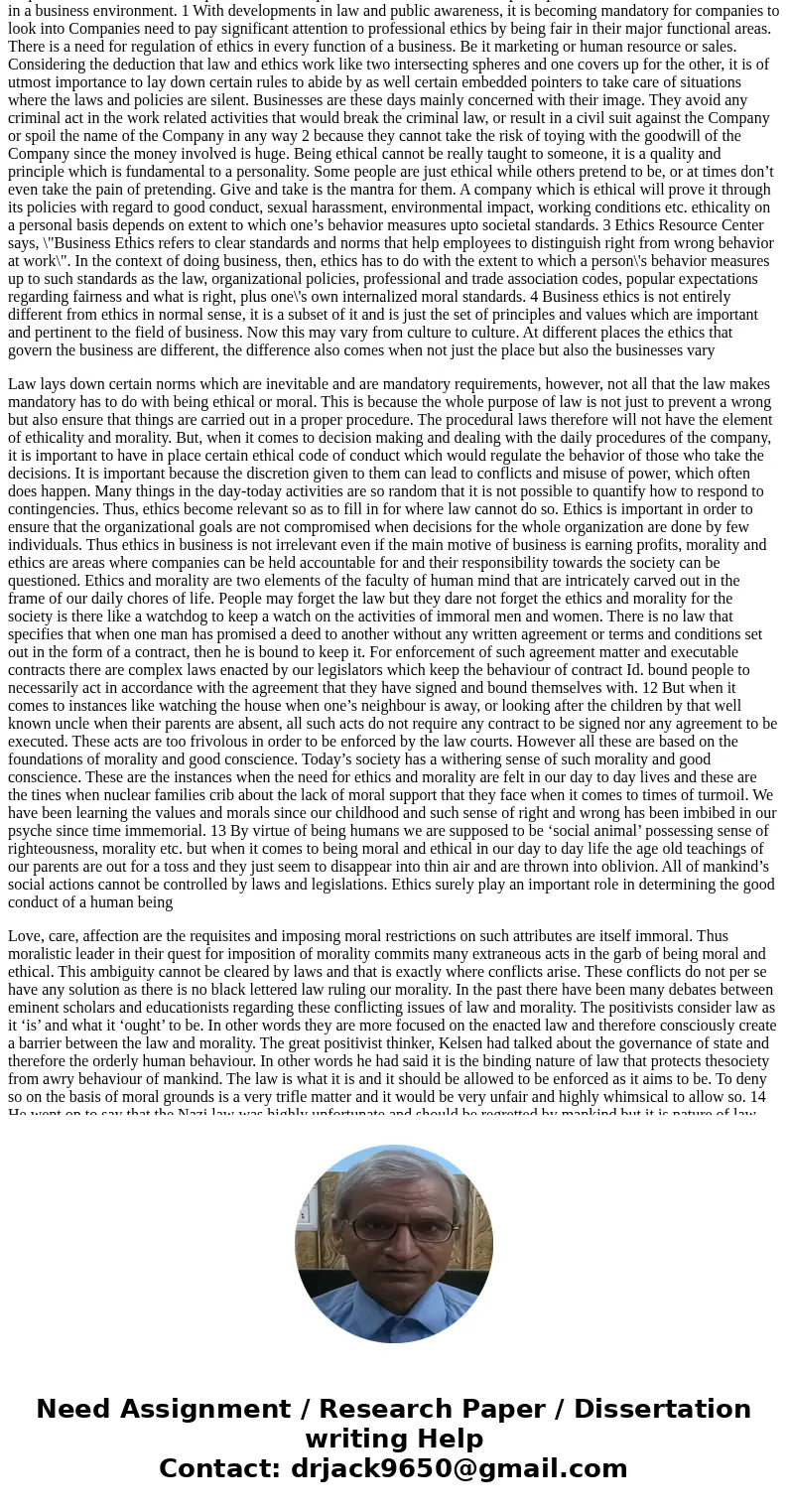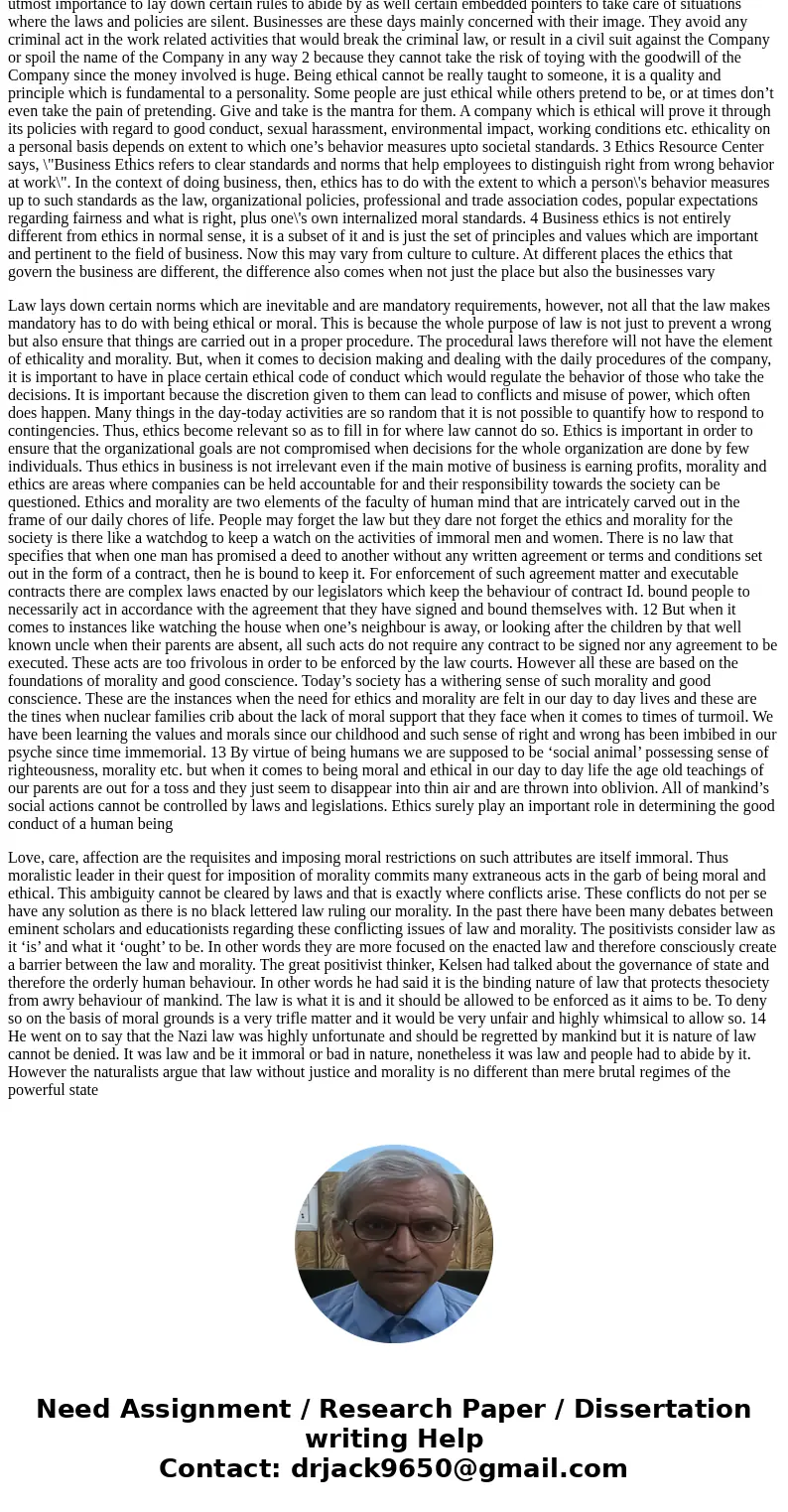Discuss the difference between negligence and an intentional
Discuss the difference between negligence and an intentional tort. Analyze and evaluate the various issues presented while arguing and debating the connections between business, law, politics, and ethics.
Solution
Intentional Torts vs. Negligent Torts
A common point of confusion is the difference between intentional torts, like assault and battery, and negligent torts, like in an automobile accident. Intentional torts occur when the defendant intentionally causes harm or injury to the plaintiff. Assault and battery are two well-known examples of intentional torts, but they are commonly confused with one another. The main difference between the two is that assault is putting someone in fear of a future battery, and there is not any actual physical contact involved. Battery is actually causing physical bodily contact or harm to another. Assault is typically intended to threaten the victim, while battery is intended to cause harm to the victim. Although the two often go hand-in-hand, that is not always the case. You can have a battery claim without having an assault claim, and you can have an assault claim without a battery claim.
For example, you can have a battery without an assault if you did not see the battery coming, like if you were asleep, or if the person came up from behind you. In either of those instances, you would have a claim for battery, but you would not have a claim for assault because there was no “fear” of the future battery. Similarly, you can also have an assault without a battery; for example, if the person does not actually carry out the contact, but still causes you to be in “fear” that you were going to be harmed.
The opposite of an intentional tort is a negligent tort. Negligent torts are not committed on purpose, but rather they are committed when a person fails to use “reasonable care” and causes harm to another. The elements needed to prove a negligent tort are: duty, breach of that duty, proximate cause, and harm. The duty is the requirement to use “reasonable care” to avoid injuring you, the plaintiff. The harm is the actual loss or damage that results from the defendant’s breach of duty. Although it may seem that you have a better chance at collecting damages if someone did something intentionally against you; in fact the opposite can oftentimes be true.
You can bring a cause of action against a defendant for both intentional torts and negligent torts. Both types are actionable, and both types are compensable. However, an important distinction between litigating an intentional tort claim and a negligent tort claim is that generally, insurance companies do not include coverage in their policies for damages awarded in connection to intentional torts. That means that if you are the victim of an intentional tort, you may not be able to collect any damages through the defendant’s insurance policy, so you will only be able to collect damages if the defendant has sufficient assets to cover the amount awarded in damages. Although insurance policies do allow coverage for some intentional torts, they are not those that are associated with an auto accident. Some intentional torts typically included in insurance policy coverage are: defamation, trademark infringement, unfair competition, copyright infringement, false imprisonment, employment discrimination, and wrongful termination.
In contrast, for negligent torts, defendants generally have insurance that you would be able to collect damages through; it can be automobile insurance or homeowners insurance, or in the case of a business, general liability insurance. Being able to collect damages from a defendant through his insurance policy is a good way to ensure that you will get the money that you have been awarded, the money you deserve. Although it can be more difficult to collect the damages that you were awarded for intentional torts because of the
Connection between law business politics and ethics
Ethics has a role in the imparting of justice while dealing areas where law is not clear, where there is still a degree of uncertainty in the enforcement of the statute. Society develops a conscious approach to fill this gap where law has no say. Government policies are also based on law but the greater need of the society and the good governance of the state is the ultimate objective of any policy that is formulated by the legislature. All the leaders and managers in an organization are also governed by certain principles. There are times when business decisions have to be made and it need not necessarily be what the law says. Ethics and law are separate spheres which intersect each other. Business is all about making money and earning profits, so when exactly one has to be ethical? Ethics has to do with one’s behavior towards the society. Business ethics is the extent to which the employees’ behavior match up to the standards of the company, its organizational policies and expectations regarding what is right and what is wrong. Thus the need for ethics and moral obligations cannot be denied in the enactments of the government policies which answer both the statutory obligations as well as the moral obligation that the state has towards the public. Competition has no doubt increased in the market, and there is no way that companies can afford to have failures even of the smallest magnitude. In order to avoid any kind of failure companies can take to any method that is accessible to them. They are determined to make profits by hook or by crook. This phenomenon has become so common that the first question that arises is that of the significance of ethics in business. To what extent, if any, ethics and morality, play a role in business world? Business ethics sets standards for the corporate world in order to keep a check on companies, adherence to the basic principles and moral values, which arise in a business environment. 1 With developments in law and public awareness, it is becoming mandatory for companies to look into Companies need to pay significant attention to professional ethics by being fair in their major functional areas. There is a need for regulation of ethics in every function of a business. Be it marketing or human resource or sales. Considering the deduction that law and ethics work like two intersecting spheres and one covers up for the other, it is of utmost importance to lay down certain rules to abide by as well certain embedded pointers to take care of situations where the laws and policies are silent. Businesses are these days mainly concerned with their image. They avoid any criminal act in the work related activities that would break the criminal law, or result in a civil suit against the Company or spoil the name of the Company in any way 2 because they cannot take the risk of toying with the goodwill of the Company since the money involved is huge. Being ethical cannot be really taught to someone, it is a quality and principle which is fundamental to a personality. Some people are just ethical while others pretend to be, or at times don’t even take the pain of pretending. Give and take is the mantra for them. A company which is ethical will prove it through its policies with regard to good conduct, sexual harassment, environmental impact, working conditions etc. ethicality on a personal basis depends on extent to which one’s behavior measures upto societal standards. 3 Ethics Resource Center says, \"Business Ethics refers to clear standards and norms that help employees to distinguish right from wrong behavior at work\". In the context of doing business, then, ethics has to do with the extent to which a person\'s behavior measures up to such standards as the law, organizational policies, professional and trade association codes, popular expectations regarding fairness and what is right, plus one\'s own internalized moral standards. 4 Business ethics is not entirely different from ethics in normal sense, it is a subset of it and is just the set of principles and values which are important and pertinent to the field of business. Now this may vary from culture to culture. At different places the ethics that govern the business are different, the difference also comes when not just the place but also the businesses vary
Law lays down certain norms which are inevitable and are mandatory requirements, however, not all that the law makes mandatory has to do with being ethical or moral. This is because the whole purpose of law is not just to prevent a wrong but also ensure that things are carried out in a proper procedure. The procedural laws therefore will not have the element of ethicality and morality. But, when it comes to decision making and dealing with the daily procedures of the company, it is important to have in place certain ethical code of conduct which would regulate the behavior of those who take the decisions. It is important because the discretion given to them can lead to conflicts and misuse of power, which often does happen. Many things in the day-today activities are so random that it is not possible to quantify how to respond to contingencies. Thus, ethics become relevant so as to fill in for where law cannot do so. Ethics is important in order to ensure that the organizational goals are not compromised when decisions for the whole organization are done by few individuals. Thus ethics in business is not irrelevant even if the main motive of business is earning profits, morality and ethics are areas where companies can be held accountable for and their responsibility towards the society can be questioned. Ethics and morality are two elements of the faculty of human mind that are intricately carved out in the frame of our daily chores of life. People may forget the law but they dare not forget the ethics and morality for the society is there like a watchdog to keep a watch on the activities of immoral men and women. There is no law that specifies that when one man has promised a deed to another without any written agreement or terms and conditions set out in the form of a contract, then he is bound to keep it. For enforcement of such agreement matter and executable contracts there are complex laws enacted by our legislators which keep the behaviour of contract Id. bound people to necessarily act in accordance with the agreement that they have signed and bound themselves with. 12 But when it comes to instances like watching the house when one’s neighbour is away, or looking after the children by that well known uncle when their parents are absent, all such acts do not require any contract to be signed nor any agreement to be executed. These acts are too frivolous in order to be enforced by the law courts. However all these are based on the foundations of morality and good conscience. Today’s society has a withering sense of such morality and good conscience. These are the instances when the need for ethics and morality are felt in our day to day lives and these are the tines when nuclear families crib about the lack of moral support that they face when it comes to times of turmoil. We have been learning the values and morals since our childhood and such sense of right and wrong has been imbibed in our psyche since time immemorial. 13 By virtue of being humans we are supposed to be ‘social animal’ possessing sense of righteousness, morality etc. but when it comes to being moral and ethical in our day to day life the age old teachings of our parents are out for a toss and they just seem to disappear into thin air and are thrown into oblivion. All of mankind’s social actions cannot be controlled by laws and legislations. Ethics surely play an important role in determining the good conduct of a human being
Love, care, affection are the requisites and imposing moral restrictions on such attributes are itself immoral. Thus moralistic leader in their quest for imposition of morality commits many extraneous acts in the garb of being moral and ethical. This ambiguity cannot be cleared by laws and that is exactly where conflicts arise. These conflicts do not per se have any solution as there is no black lettered law ruling our morality. In the past there have been many debates between eminent scholars and educationists regarding these conflicting issues of law and morality. The positivists consider law as it ‘is’ and what it ‘ought’ to be. In other words they are more focused on the enacted law and therefore consciously create a barrier between the law and morality. The great positivist thinker, Kelsen had talked about the governance of state and therefore the orderly human behaviour. In other words he had said it is the binding nature of law that protects thesociety from awry behaviour of mankind. The law is what it is and it should be allowed to be enforced as it aims to be. To deny so on the basis of moral grounds is a very trifle matter and it would be very unfair and highly whimsical to allow so. 14 He went on to say that the Nazi law was highly unfortunate and should be regretted by mankind but it is nature of law cannot be denied. It was law and be it immoral or bad in nature, nonetheless it was law and people had to abide by it. However the naturalists argue that law without justice and morality is no different than mere brutal regimes of the powerful state



 Homework Sourse
Homework Sourse